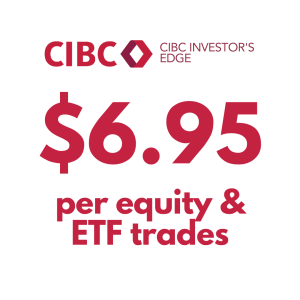
What’s all the buzz with ETFs? For starters, these investment vessels have seen a record asset investment value in 2023: $10.32 trillion dollars. Reinvested dividends, diversification potential, and liquidity make ETFs an attractive investment choice. Plus, research head Todd Rosenbluth points out that US ETF investors access international equities via ETFs. But for beginner investors, what does an ETF really mean? And are they the same in the US and Canada? These are some of the questions our roster of rated and certified financial advisors at AdvisorSavvy get from Canadians looking to invest. But if you’re in a rush? We’ll give you the lowdown on the best US ETFs in Canada with this article. Continue reading to learn more!

Table of contents
What is an ETF?
ETF stands for “exchange-traded fund.” It’s a pooled investment vehicle where multiple investors can invest money into a collection of stocks, bonds, or other asset classes managed by a company. That company charges a small management fee and decides how to distribute the money across securities, often under a particular theme. For example, tech ETFs and utility ETFs.
Kind of sounds like a mutual fund, right? They’re similar in the way that you lower risk by investing in multiple securities within the same fund. Plus, you get a delicious side of diversification. However, ETFs are traded on the stock market, which makes them more flexible and liquid — mutual funds are not the same.
Different types of ETFs also have a unique tracking mechanism where they performance track specific indexes and investment strategies. For example, gold ETFs track the performance of physical gold.
CIBC Investor’s Line Offer
Up to $6.95 per online stock or ETF trade. Plus, there’s no minimum account balance.
Can I buy US ETFs in Canada?
Yes, Canadians can purchase US ETFs on the stock exchange. You can see the appeal — for starters, diversification in your portfolio. Additionally, many US ETFs are cheaper in share price than Canadian ones.
But you’ll still need to factor in conversion fees that can eat into your profits. Still, if you have some USD handy? Enjoy the smaller ticket price of a US ETF. Alternatively, you can use Norbert’s Gambit to save on foreign exchange fees.
Now, why else would Canadians want to invest in US ETFs? Remember that management fee we mentioned earlier? US ETFs have much lower ones. On top of that, Canadian RRSP investors can reap some tax benefits by opting for US ETFs (but more on that later).
Related Reading: Bond ETF vs Stock ETF: Which is better?
What is the best way for Canadians to invest in US ETFs?
The investment itself can be done on your stock trading platform like Questrade or Interactive Brokers or online investing sections of your online banking. But what guides the strategy behind your investment?
The best way for Canadians to invest in US ETFs is via their RRSPs. Why? Because dividends within your RRSP (even if from US ETFs) are not subject to the 15% Foreign Withholding Tax. That’s a significant win, maximizing your overall return on investment and keeping more of that coin in your pocket for when you need it the most. You may also consider investing in one of the best US ETFs available in Canada through a TFSA, which also has tax benefits.
Related Reading: Top 10 Mutual Fund Companies in Canada
Are US ETFs taxed in Canada?
Yes. If you earn dividends from a US ETF as a Canadian, your earnings are subject to the US Foreign Withholding Tax — a meaty 15%. This applies to all US ETFs.
Canadian Portfolio Manager cautions investors of this tax implication. To mitigate, they suggest you instead purchase Canadian-listed ETFS that hold US-listed equity ETFs. Another way to minimize that tax burden is through your RRSP or TFSA, as mentioned above.
So, which of the best US ETFs in Canada should you invest in this year? We’ll walk you through a few of our favorites and expert recommendations across the industry next.
Related Reading: 5 Best Money Market ETFs in Canada
CIBC Investor’s Line Offer
Up to $6.95 per online stock or ETF trade. Plus, there’s no minimum account balance.
5 Best US ETFs in Canada
Here are some of the best US ETFs in Canada based on yield rates, bid, and overall performance:
| Ticker | Assets Under Management (AUM) | Management Expense Ratio (MER) | Risk Level |
| BOTZ | $2.57B | 0.69% | Medium |
| MGK | $17.2B | 0.07% | High |
| IYR | $2.9B | 0.40% | Medium |
| QQQ | $252B | 0.2% | Medium |
| ZLU | $1.5B | 0.33% | Medium |
1. Global X Robotics & Artfcl Intllgnc ETF (BOTZ)
What tech company hasn’t invested in AI or leveraged robotics innovations? This ETF takes the estimated $2 trillion market value of AI for 2030 and uses it to inform their distribution of funds to companies that leverage or could benefit from leveraging both AI and robotics. The fund weighs heavily in the utility and industrial sectors, among others, and boasts an impressive YTD return of 38.62%.
2. Vanguard Mega Cap Growth ETF (MGK)
Sometimes, safe moves bring us comfort. In this case, it’s holdings in blue-chip stocks like Microsoft, Apple, Visa, and Tesla, like this Vanguard MCG ETF has. This US ETF brings a 33.6% YTD return — not too shabby. Tracking the performance of the CRSP US Mega Cap Growth Index, this ETF offers diversified access to some of the market’s fastest-growing securities. It’s also seen incredible growth rivalling most of the others on this list, nearly doubling its value within a short three years. The only downside? The MGK ETF is a bit less accessible with its beefy $284.15 bid/ask prices.
Related Reading: Cash ETF Canada
3. iShares US Real Estate ETF (IYR)
Have a soft spot for real estate? Merge the benefits of an ETF with real estate appreciation via the iShares US Real Estate ETF, which invests mainly in REITs (real estate investment trusts) and development companies. iShares boasts nearly $3 billion in invested assets — understandable considering the company’s twenty-year tenure and affordable 0.40% management fee. Cubesmart, American Tower, Camden Property Trust, and Boston Property REITS are all holdings of iShares.
CIBC Investor’s Line Offer
Up to $6.95 per online stock or ETF trade. Plus, there’s no minimum account balance.
4. Invesco QQQ-ETF (QQQ)
Continuing the tech focus of Global X, Invesco QQQ-ETF has been in the game for over twenty years. This fund spreads investments across NASDAQ-100 companies and prides itself in outperforming even the S&P 500 Index. As of May 1, 2023, this ETF was the most widely traded in the US, and for good reason. Those who invested ten years ago would see a near-5X return today. If you’re looking to diversify your investment portfolio with a touch of innovative tech, we can’t think of a safer way to do so than through the Invesco QQQ-ETF.
5. BMO US Low Volatility US Equity ETF
Interested in US equities without the volatility? BMO’s ETF might be a solid fit. They invest funds across US companies with minimal risk-factor, nearly 100% in stock securities. Some holdings include giants like Johnson & Johnson, Kellogg Co, and Campbell Soup Co., three stocks that make up the fund’s majority consumer staple sector allocation. Excluding a small dip during pandemic times, this ETF has seen consistent growth over the last ten years. Initial investment started at around $10,000 in 2013 and has since climbed to $36,000 in 2023. One qualm? The management fee is a tad higher than competitive ETFs at 0.33%.
Related Reading: 7 Best High Yield ETFs in Canada
Investing in the US Market as a Canadian
ETFs from south of the border bring savvy Canadian investors opportunities to save on management fees and diversify their portfolios. Still, jumping into the stock market blind is never a solid strategy. What’s the yield rate on your ETFs of choice? How do they fit into your overall investment strategy and financial goals? You’ll find a few of those answers with research but you might need a helping hand to dive in confidently.
That’s where a financial planner comes in. AdvisorSavvy connects thousands of Canadians like you with rated, certified financial planners to help them map out their financial goals. Ready to make the most out of US ETFs in your portfolio? Talk to a financial advisor today!
Read More: How to Invest in Index Funds in Canada


